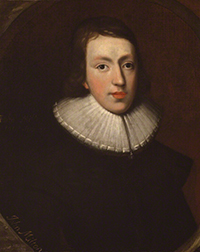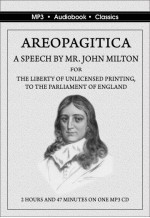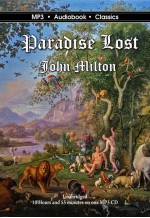John Milton
 | John Milton (December 9, 1608 – November 8, 1674) was an English poet and polemicist widely ranked as one of the “preeminent writers in the English language”. He was born in London to a prosperous family and was tutored privately before attending Cambridge. After graduating in 1632 he studied privately for six years and then traveled the European continent. He returned to England in 1639 to work as a private schoolmaster and launch a career as a pamphleteer as tensions were building towards the English Civil Wars. The desertion of his bride shortly after their marriage in 1642 prompted him to publish tracts on divorce;subsequent conflict with the authorities drove him to write Areopagitica. In 1649 he was appointed Secretary of Foreign Tongues for the Commonwealth of England, handling foreign correspondence in Latin and gaining recognition throughout Europe for his defense of the English people. He served in the position even after becoming totally blind until the Restoration in 1660, when he was arrested and briefly imprisoned before gaining release through the intervention of friends. He lived quietly in London thereafter. Recognition for his poetry came late; his early poetry was published anonymously except fora collection of poems in 1645. Highly literate, he wrote in Latin, Greek and Italian as well as English, coined numerous new English words from Latin and was the first to write non-rhymed verse outside a theatrical setting. The publication of Paradise Lost in 1667 brought him immediate renown as a major epic poet. He has been cited as important influence by many, among them Alexander Pope, Samuel Johnson, Edmund Burke, William Blake, William Wordsworth, George Eliot,and Thomas Hardy. |
Areopagitica
Areopagitica, subtitled A speech of Mr. John Milton for the Liberty of Unlicensed Printing, to ..
$9.99
Paradise Lost
The story of Adam and Eve, the original human couple in the book of Genesis, is the story of mankind..
$11.99


